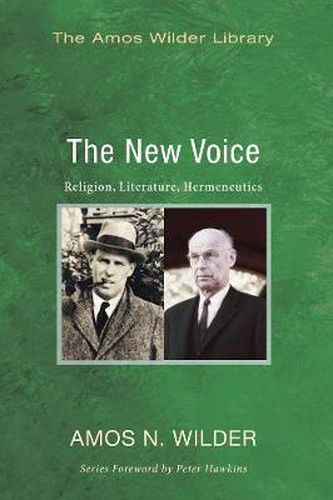Readings Newsletter
Become a Readings Member to make your shopping experience even easier.
Sign in or sign up for free!
You’re not far away from qualifying for FREE standard shipping within Australia
You’ve qualified for FREE standard shipping within Australia
The cart is loading…






This title is printed to order. This book may have been self-published. If so, we cannot guarantee the quality of the content. In the main most books will have gone through the editing process however some may not. We therefore suggest that you be aware of this before ordering this book. If in doubt check either the author or publisher’s details as we are unable to accept any returns unless they are faulty. Please contact us if you have any questions.
In The New Voice, Amos Wilder carries forward and combines two areas of activity represented in his earlier, groundbreaking publications. One of these is that of the theological critic, concerned with modern literature as it illuminates the quests of our age and the vicissitudes of our religious tradition, as found in his Modern Poetry and the Christian Tradition and Theology and Modern Literature. The other area is that of biblical scholarship, especially in its recent concern with hermeneutics and the modes of language, as represented by his volume on early Christian rhetoric, The Language of the Gospel. Wilder seeks in the present book to deepen and correct the approach of the theological critic by urging that rhetorical criteria should receive primary attention and that language should be explored in new ways. Wilder therefore examines certain aspects of biblical genre and style as ways of illuminating modern rhetoric and its underlying assumptions. It is a main theme of the work that the disorders and travail of our time should be construed in a positive light, and that the most significant writing of the period not only illuminates contemporary reality but fashions a language in which the abiding legacies and archetypes of the past can again be brought to speech. Writers specially discussed in the book range from Musil, Proust, Eliot, and Gide to Sartre, Perse, Beckett, Lowell, David Jones, and the exponents of open verse. The work of many others is brought into relation with the task defined by Pound as naming things accurately and by Stevens as making the bread of faithful speech.
$9.00 standard shipping within Australia
FREE standard shipping within Australia for orders over $100.00
Express & International shipping calculated at checkout
This title is printed to order. This book may have been self-published. If so, we cannot guarantee the quality of the content. In the main most books will have gone through the editing process however some may not. We therefore suggest that you be aware of this before ordering this book. If in doubt check either the author or publisher’s details as we are unable to accept any returns unless they are faulty. Please contact us if you have any questions.
In The New Voice, Amos Wilder carries forward and combines two areas of activity represented in his earlier, groundbreaking publications. One of these is that of the theological critic, concerned with modern literature as it illuminates the quests of our age and the vicissitudes of our religious tradition, as found in his Modern Poetry and the Christian Tradition and Theology and Modern Literature. The other area is that of biblical scholarship, especially in its recent concern with hermeneutics and the modes of language, as represented by his volume on early Christian rhetoric, The Language of the Gospel. Wilder seeks in the present book to deepen and correct the approach of the theological critic by urging that rhetorical criteria should receive primary attention and that language should be explored in new ways. Wilder therefore examines certain aspects of biblical genre and style as ways of illuminating modern rhetoric and its underlying assumptions. It is a main theme of the work that the disorders and travail of our time should be construed in a positive light, and that the most significant writing of the period not only illuminates contemporary reality but fashions a language in which the abiding legacies and archetypes of the past can again be brought to speech. Writers specially discussed in the book range from Musil, Proust, Eliot, and Gide to Sartre, Perse, Beckett, Lowell, David Jones, and the exponents of open verse. The work of many others is brought into relation with the task defined by Pound as naming things accurately and by Stevens as making the bread of faithful speech.